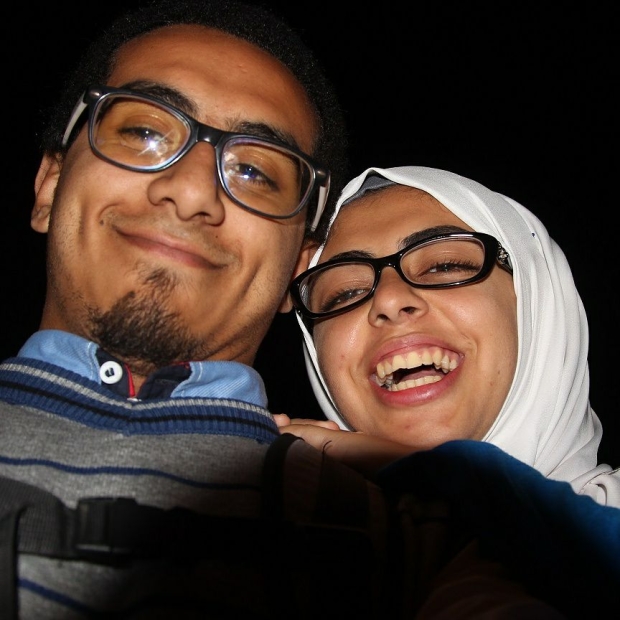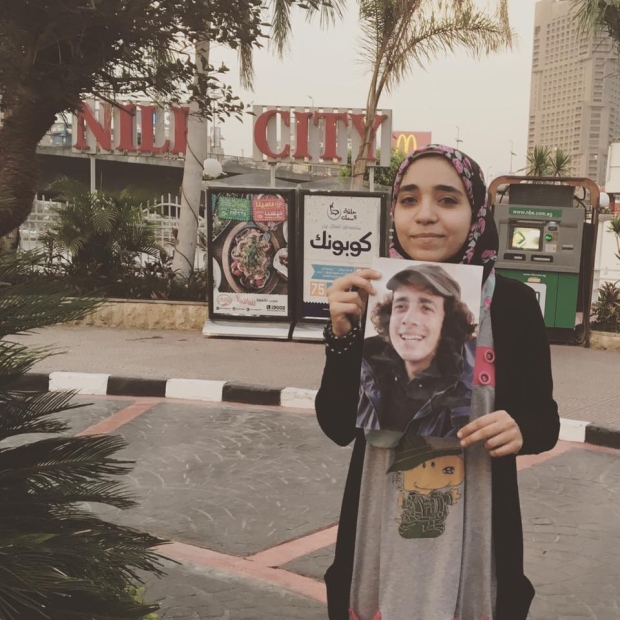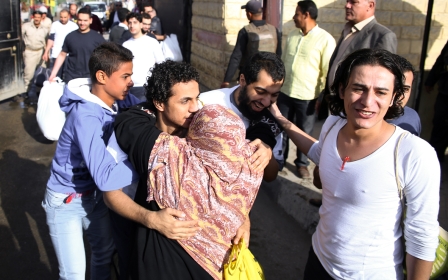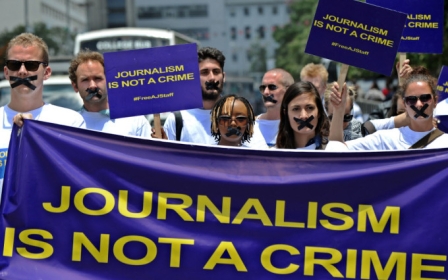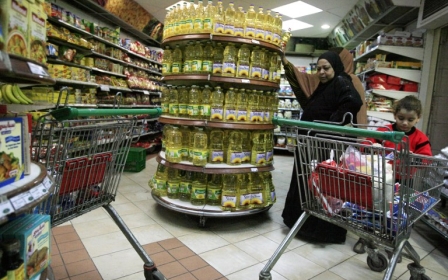Women in Egypt's prisons: 'I know I’m stronger. I went through the worst already'
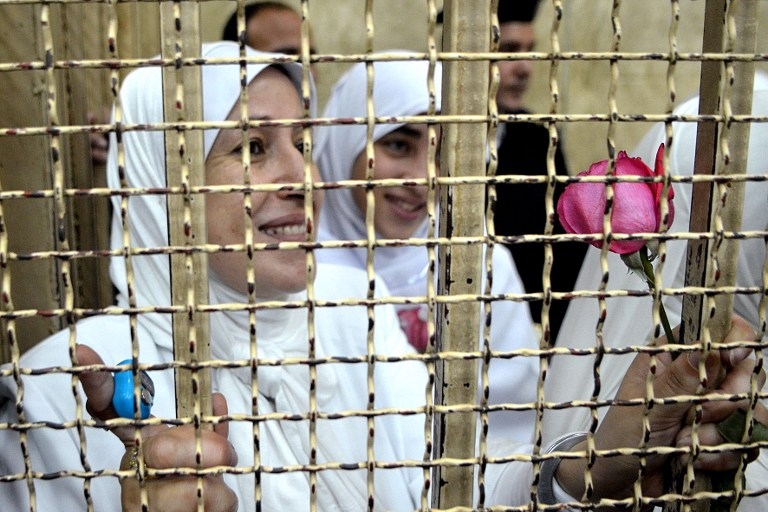
CAIRO - “If there is one thing that this prison experience has taught me, it is that I know I’m stronger; I went through the worst already,” said Asmaa Hamdy, a dentistry student at al-Azhar University.
Hamdy was arrested in late 2013 when protests against the military coup that toppled president Mohamed Morsi, a leading member of the Muslim Brotherhood, took place on campus.
“I never imagined I would go through all of this,” she told Middle East Eye. “I thought that we would be freed once we stood on trial. But we were sentenced to five years instead; I realised it was real,” she continued.
Along with three of her colleagues, Hamdy was given a five-year prison term. After spending three years in jail, she was eventually set free after winning an appeal that acquitted her.
Six months after her sentencing, and a few days after the election of President Abdel Fattah al-Sisi, Hamdy and all the political detainees in al-Qanater prison for women were beaten and assaulted by other inmates accused of criminal offences.
‘If there is one thing that this prison experience taught me is that I know I’m stronger. I went through the worst already’
- Asmaa Hamdy, a former detainee
According to Hamdy, the attack was incited by the prison’s administration. In her account of the beginning of the brawl, one prison guard picked a fight with a political inmate. While the remaining women gathered to ascertain what was going on, a scuffle broke out.
“Criminal inmates stormed our cell immediately; they were beating us with everything in their hands - batons, sticks, and with their bare hands. They threw dust at us; they dragged us on the floor; it was all for no reason, just blind hatred,” she said. “I was severely beaten and physically inspected in the most humiliating way."
“It was the most horrific situation I have ever gone through in my entire life,” she added.
'I was severely beaten and physically inspected in the most humiliating way'
- Asmaa Hamdy, a former detainee
After this attack, all female detainees involved in politically motivated cases were separated from each other and many of them were sent to different prisons. Hamdy was transferred to Damanhour prison in the delta.
Keeping her going was the dream that all of her problems would end upon release from prison. But when her day of freedom did come, it was nothing but salt in her wound.
Her fiancée, journalism student Ibrahim Ragab, had disappeared just one week before her release.
“Ibrahim was the only thing that made prison seem bearable. I was counting the days to freedom in order for us to get married, now everything is gone,” she said.
Hamdy searched for her missing fiancée for 81 days before Ragab was finally found in a police station in the northern city of Zaghazig where they live.
“I’m happy I finally found him. It feels pathetic that you are happy that your fiancée is jailed, but at least I’m sure he is alive, at least I know where he is,” she said.
‘It feels pathetic that you are happy that your fiancée is jailed, but at least I’m sure he is alive’
- Asmaa Hamdy, a former detainee
To Hamdy, it was the beginning of a new phase in anguish.
“My first suffering of my jail ended, and now I’m living another type of suffering: he is in jail.”
Facing protest-related charges, Ragab was allegedly tortured and kept in a state security detention facility for the entire period of his disappearance. The sole reason for his arrest was that Ragab was accompanying his friend Amir al-Yamany, who is wanted by security forces for allegedly being a member of the Muslim Brotherhood, which Egypt declared a terrorist group in 2013.
Life after prison
In the days when she is not visiting her fiancée or preparing to visit, Hamdy just tries to cope with the overwhelming feelings by visiting friends in Cairo and following up with her plans to attend Azhar University again. Though it is where her ordeal began, she is not afraid to return.
“I’m not afraid of coming back to university," she said.
'They were beating us with everything in their hands - batons, sticks, and with their bare hands'
-Asmaa Hamdy, a former detainee
Hamdy is not alone. There are no official statistics on the number of detainees in politically motivated charges since 2013, but Daftar Ahwal, an independent archiving initiative, has documented over 37,000 cases of arrests under the country’s notorious Protest Law.
Since the law was passed in 2013, around 1000 of these cases were filed against women.
Nazra for Feminist Studies, an NGO dedicated to advancing women's rights, has also documented violations against women following the violent dispersal of the protest camps at Rabaa al-Adawiya and Nahda squares.
They concluded that 19 women were killed in the dispersals and 52 others were arrested. A Human Rights Watch (HRW) report states that at least 1,000 Egyptians, predominantly supporters of the Muslim Brotherhood, were killed during the forcible dispersal of the protesters.
'I will never forget those days'
Sara Khaled, also a dentistry student in a private university, was Hamdy's cellmate at al-Qanater prison. She was arrested under similar conditions as she was passing by a protest at Azhar University.
“The protests were intense, and I was putting a pin with the yellow sign supporting the [Muslim Brotherhood] on, so I was easily identified by the police. They arrested me immediately,” she said.
Khaled was referring to the symbol of four-fingers on top of a yellow background emblematic of continued support for the Brotherhood and protests against the government.
According to Khaled, she has no affiliations to the Muslim Brotherhood and only put the pin on as a show of solidarity with the victims of the Rabaa massacre. The pin was used as evidence against her when she was accused of participating in violent protests and being a member of the banned group.
Khaled was sentenced to two years in prison, but only completed 10 months of her time after she was acquitted during an appeal.
She was subject to the same insults Hamdy faced inside prison, but her experience was even harsher.
“I was severely beaten and covered with dust. I went to the bath to take a shower, and my clothes were stolen while I was inside. I was completely alone," she said.
"I will never forget those days, imagine spending all this time with criminals, killers and drug dealers,” she added.
'Imagine spending all this time with criminals, killers and drug dealers'
-Sara Khaled, a former detainee
Just like Hamdy, Khaled is trying to cope by working hard in reapplying to private university and continue her studies. Much of her time is spent on Facebook, speaking out on behalf of those that remain inside prisons.
“This worries my family a lot. They always ask me to stop writing about politics on Facebook out of fear that I may be jailed again, but at the same time they understand how I’m attached to this cause because of my jail experience."
There are a number of cases where women have been arrested in protest-related charges. Around 21 women were detained as they were protesting against the removal of Morsi by forming a human shield on the streets of Alexandria in November 2013.
Fourteen of them were handed 11-year sentences, while the rest were kept in a juvenile facility. Fortunatel, the sentences were revoked when pressure mounted under a public outcry.
In June 2014, three female activists were also arrested while challenging the Protest Law as they marched to the presidential palace. They were later sentenced to two years in prison.
Activists Sanaa Seif, Yara Sallam and Salwa Mehrez were later released following a pardon issued by President Sisi in September 2015.
Seif was then jailed again for six months in May 2016 for insulting public officials when she publicly questioned the independence of the prosecution.
After Sisi's coup, security forces initially targeted members of the Muslim Brotherhood but later expanded the crackdown to include other opposition figures and youth activists.
Other women, like photographer Esraa al-Taweel, have also fallen victim to the mass arrests.
'They asked me about everything in my life'
It was almost two years ago in the upscale Maadi district of Cairo when Taweel was getting ready to go out for dinner with her fiancee Omar Mohamed, an engineering student. She never expected that the day would end with her going to prison for six months.
Joined by their common friend Sohaib Saad on this evening out, Taweel, Mohamed and Saad were arrested by men in plain clothing.
Taweel was jailed for six months for allegedly belonging to Muslim Brotherhood but was released in December 2015.
Her fiancee and Saad both faced a military trial and were sentenced to life in prison for allegedly being involved in “terrorist” attacks and belonging to the banned group.
The live ammunition struck her during the violent dispersal of peaceful protests on the day that marked the third anniversary of the January 25 revolution.
“When the bullet hit me, it fractured into three parts, two of them in my kidney and the third in my back, which caused a physical paralysis that kept me unable to move for one year and a half," she said. "I was just starting to heal and walk when I was arrested. Why would I ever be accused of doing something I never committed? I was already suffering."
As for Mohamed, the campaign calling for his release which is titled “Freedom for the one who has nothing to do with it,” is an indication of how apolitical he was.
'Why would I ever be accused of doing something I never committed? I was already suffering,”
- Esraa al-Taweel, former detainee
It took six months of convincing Egyptian authorities that Taweel has no affiliations to the Muslim Brotherhood. Despite being arrested with her fiancee at the same time and eventually gaining her freedom, to this day she has no idea of why he is still being held in a military prison.
“I ask myself this question a million times a day, but there’s no answer,” she added.
The 25-year-old went missing for almost three weeks, during which she believes she was held in a state security detention facility and was not permitted to contact her family members.
Following her arrest, she was interrogated by security forces for 18 hours without a lawyer.
“They asked me about everything in my life, from why I know many Islamist and leftist people, to how I bake a cheesecake.”
During this time, her family launched a media campaign in hopes of finding her, while the Interior Ministry adamantly denied arresting her in the first place.
When she was moved to al-Qanater prison, Taweel felt a sense of relief.
“I felt like my soul was back in my body, the prison was like a paradise for me. I know it sounds weird, but at least I know where I am, at least there are people around me, even if I was trapped in a prison cell with 40 other women,” she said.
'They asked me about everything in my life, from why I know many Islamist and leftist people, to how I bake a cheesecake'
- Esraa al-Taweel, former detainee
A woman who was visiting a jailed relative recognised Taweel from the media campaign and immediately told the family of her whereabouts.
The next day as the police truck was moving Taweel outside of the prison to another area for formal interrogation, Taweel unexpectedly saw her sister and friend who had gone by to try to see her, and eagerly waved to her loved ones.
Following this event, Taweel was moved to a bigger cell with other political detainees until she was released.
'I discovered a whole new world'
Knowing her fiancée was still jailed did not ease her discomfort, so Taweel embarked on a journey to seek his release. She has the support of a number of international campaigns. Amnesty International is calling for Mohamed's freedom, saying that he was tortured and under duress was forced to confess that he committed violent crimes.
“We are hoping that we can get a presidential pardon for him in the next list of pardons prepared by the presidential committee, whose members constantly promised that Omar will be pardoned. I’m also hoping that we can finish our marriage procedures inside prison,” Taweel added.
Until now, however, prison authorities have not allowed them to go ahead with their marriage procedures.
“They separated us from each other and don’t want even to let us get married,” she said.
Meanwhile, Khaled feels worried about those she left behind.
“I know heartbreaking stories of women implicated in political cases, and I realised that I was really better off. Many of these women are old, some of them are grandmothers, and they are implicated in very serious cases," she said.
"I discovered a whole new world I never imagined ever existed. These are emotional and psychological wounds that never fade away.”
Middle East Eye propose une couverture et une analyse indépendantes et incomparables du Moyen-Orient, de l’Afrique du Nord et d’autres régions du monde. Pour en savoir plus sur la reprise de ce contenu et les frais qui s’appliquent, veuillez remplir ce formulaire [en anglais]. Pour en savoir plus sur MEE, cliquez ici [en anglais].


